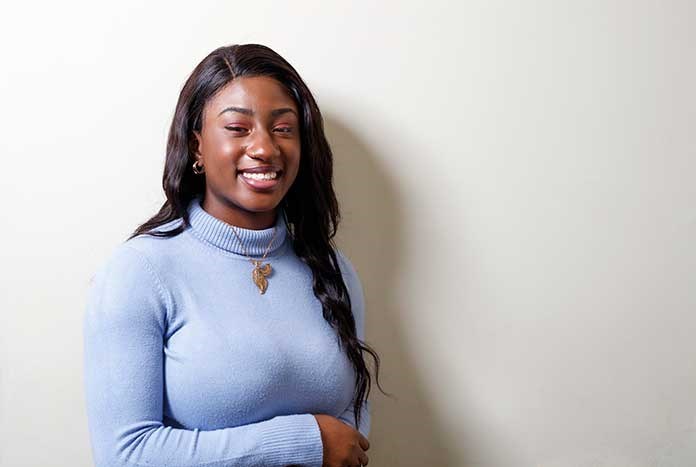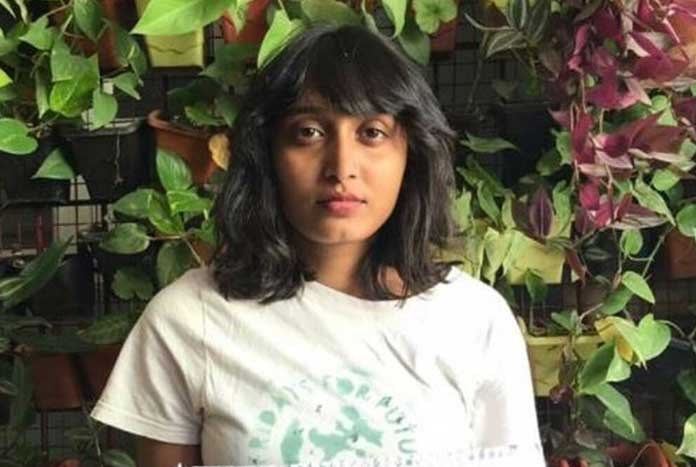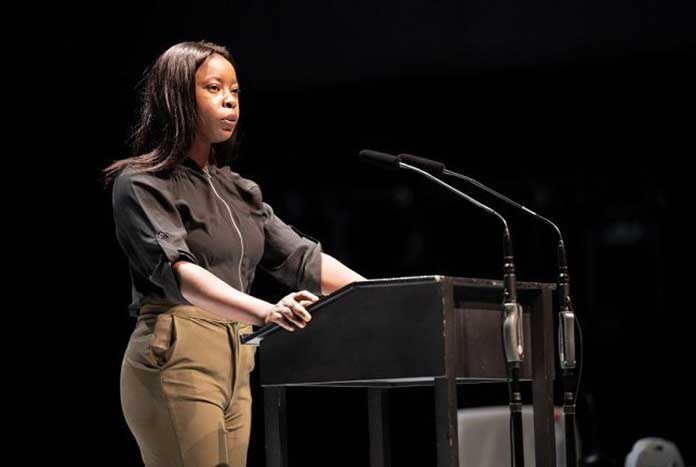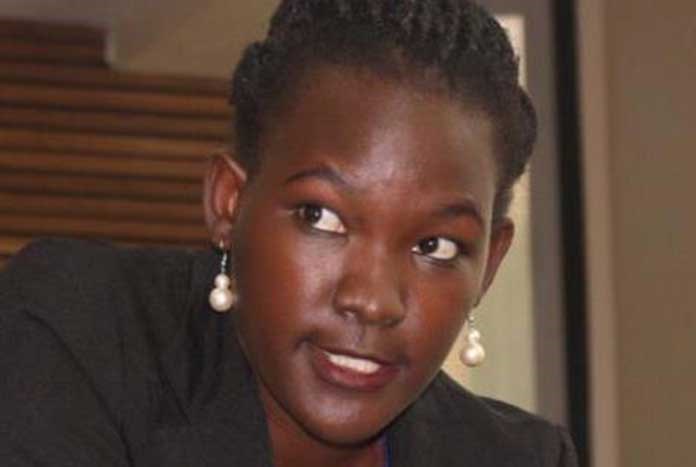Subscribe to ‘Words Of Hope’
Get our emails direct to your Inbox with updates about all our campaigns, trips and events.
“During my interview, I was asked a question that I didn’t know the answer to but will never forget: “what do you think the link is between climate change and gender?” Amos Research Intern Fleur Boya writes.

“I became much more aware, as these conversations continued in exposing the horrifying impact of the climate crisis on women in the Global South, of how much we, in the Global North, have contributed to the climate crisis, and how we — being the least affected — do not take enough responsibility for this.”
Amos Research Intern, Fleur Boya
Climate X Gender X Hope
— — — — — — —
I had not heard of Amos Trust before my interview. I didn’t know what to expect, nor did I know what was expected of me as a potential new team member of this small, creative human rights organisation near London Bridge. All I knew was that, after obtaining my Master’s degree in Diplomacy and Foreign Policy, I wanted to begin my career as a researcher in advocacy and human rights — and what better way to start than as an Intern.
During my interview, I was asked a question that I didn’t know the answer to but will never forget: “what do you think the link is between climate change and gender?”. At the time, these were two mutually exclusive issues to me. I knew climate change caused extreme weather in different parts of the world and I knew gender injustice to be a longstanding issue in Western countries, but even worse for women living in the Global South. These two concepts, however, had never intersected in my mind.
When I was hired, I began preparing for Amos Day — and it was in that preparation that I began to learn more about the difficult answer to that interview question.
The intersectional injustice of Climate Change against Women
I had the privilege of organising conversations with three female climate activists from the Global South, which were then presented as a short film at Amos Day in October 2021 — our first in-person event since the pandemic began.
These three inspirational women: Disha Ravi, leader of the Fridays for Future movement in India and part of the Fridays For Future MAPA International Team; Adenike Oladosu, founder of I Lead Climate that specialises in peace, security and equality especially within the Lake Chad region and Immaculate Akello, Ugandan lawyer and climate change activist and team leader for Generation Engage Network, highlighted the devastating impact that the climate crisis is having on the lives of women and girls in India, Nigeria and Uganda — many of whom share an alarming number of heart-wrenching similarities.

Disha Ravi, leader of the Fridays for Future movement in India
— — — — — — —
During my conversation with Disha, she explained the impact climate change is having on rural women in India. She said: “Women are expected to take care of the household when they have the least decision making power in the house. When calamity hits, they have the least say in things yet have to be the ones to do all the work.” She added, “women in India and Bangladesh are subject to getting married a lot more when calamity hits, because they are seen as a burden”.
Nigerian activist Adenike echoed this, when she explained that “there are more than 20 million child brides in the Sahel region; families sell off their young girls to be married in order to receive a dowry to stabilise their family during environmental disasters”.
I became much more aware, as these conversations continued in exposing the horrifying impact of the climate crisis on women in the Global South, of how much we, in the Global North, have contributed to the climate crisis, and how we — being the least affected — do not take enough responsibility for this.
Women are expected to take care of the household when they have the least decision making power in the house. When calamity hits, they have the least say in things yet have to be the ones to do all the work. Disha Ravi, Fridays For Future, India
According to a report published in ‘The Lancet Planetary Health’ in September 2020, the United States alone is responsible for 40% of climate degradation today, whilst the European Union accounts for 29%. In total, the Global North is responsible for 92% of excess global carbon emissions. In addition to this, only 100 companies are responsible for 71% of global emissions, and according to a report published by Oxfam, the wealthiest 1% of the world’s population were responsible for emitting more than twice as much carbon dioxide as the poorer half of the world from 1990 to 2015.
COP26
A few weeks after Amos Day, I was able, along with two other members of the Amos team, to attend the COP26 Climate Conference in Glasgow.
Leading up to COP, activists had expressed both their scepticism and hope online. Following a history of broken promises and unmet targets from previous climate conferences — climate activists across the world were trying to remain hopeful that COP could lead to genuine negotiations - where the biggest emitters in the Global North would take responsibility for their contribution to the climate crisis and make changes that would mitigate some of the impact on the Global South. Unfortunately, it became clear to all that COP would be another failure.

Adenike Oladosu, founder of I Lead Climate
— — — — — — —
So whilst the official COP26 conference consisted of powerful governments trying to compromise between the interests of the fossil fuel industry and the demand of those most affected by climate change — it was the side events hosted by the COP26 Coalition, She Changes Climate and Extreme Hangouts, that placed women from the Global South, who are most affected by the climate crisis, centre stage. We were able to attend these fringe events and had the privilege of hearing from and connecting with young female climate activists from all over the world.
There are more than 20 million child brides in the Sahel region, families sell off their young girls to be married in order to receive a dowry to stabilise their family during environmental disasters. Adenike Oladosu, I Lead Climate
We heard heart-breaking testimonies of the devastating impacts that climate change has caused in the Global South and in small island nations. Many of these activists are creating their own movements and funding their own projects to mitigate these impacts in their communities. Ozawa Bineshi Albert, Co-Executive Director for Climate Justice Alliance (CJA) at one of the COP26 coalition sessions stated: “Let women lead, particularly let women of colour lead. I know how it needs to be cleaned up but I’m not going to clean it up — those at the top that caused this issue need to be held accountable”.
In addition to this, Teresa Anderson, Climate Policy Coordinator at ActionAid International, said in response to the final COP26 outcome: “This outcome [at COP26] is an insult to the millions of people whose lives are being torn apart by the climate crisis. There were huge expectations that COP26 would finally deliver real support for the communities, farmers, women and girls who need to recover and rebuild in the aftermath of climate disasters”.
Let women lead, particularly let women of colour lead. I know how it needs to be cleaned up but I’m not going to clean it up — those at the top that caused this issue need to be held accountable. Ozawa Bineshi Albert, Climate Justice Alliance
Though the Glasgow Climate Pact was signed, and India and China agreed to “phase down” their use of coal, it was the fossil fuel industries, who had the largest delegations at COP26, that essentially proved that countries are still not ready to make real and lasting change so long as they continue to negotiate with the biggest emitters.

Immaculate Akello, Ugandan lawyer and climate change activist and team leader for Generation Engage Network
— — — — — — —
Coming back from Glasgow, we realised that to genuinely address the climate crisis in favour of the most affected people and areas — they needed to be at the centre of negotiations. Unless the climate negotiations make drastic changes, women and girls from the most vulnerable countries will continue to be forced into sex work, sold by their families or face starvation as a result of climate change affecting weather patterns and ruining livelihoods.
Amos Trust Climate Fellowship

At Amos, we recognise that it is important for us to do our part in ensuring that women in the Global South are placed at the centre of climate talks — amplifying their voices and stories. So in March this year, Amos will be launching the Amos Climate Fellowship, a project that aims to achieve three main objectives:
The first cohort of the Amos Climate Fellowship consists of six young female climate activists from India, Namibia, Madagascar, the Philippines, Nigeria and Uganda. These women will share their ideas, experiences, and the lessons learned from one another as they connect together in solidarity. Each Climate Fellowship member will receive a grant of up to £2,000 to pursue their climate and gender justice goals in their community.
At Amos Trust, we are so excited about the Climate Fellowship as we believe that it is essential to shed light on the communities that the climate negotiations have failed to acknowledge, and to amplify the voices of female climate activists that so many — including the biggest emitters — are trying to silence.
— — — — — — —
A Little More...
More First Of The Month
Older editions of our First Of The Month essays are available to read and download here.
Words Of Hope E-news
Sign up to receive our regular ‘Words Of Hope’ emails and keep up to date with all the latest Amos news and information, including details of our trips and events, news from our partners around the world and all of our campaigns.
Online reflection
Join us every Tuesday at 5pm for ‘Words Of Hope’ — our online reflection. Simply click here to join us a few minutes beforehand.
Amos Trust
7 Bell Yard, London
United Kingdom
WC2A 2JR
Telephone:
+44 (0) 203 725 3493
Email:
[email protected]
Registered Charity No.
1164234

This item has been added to your shopping basket. Please click on the Checkout button below where you can choose your quantity.
Continue shopping Checkout Close